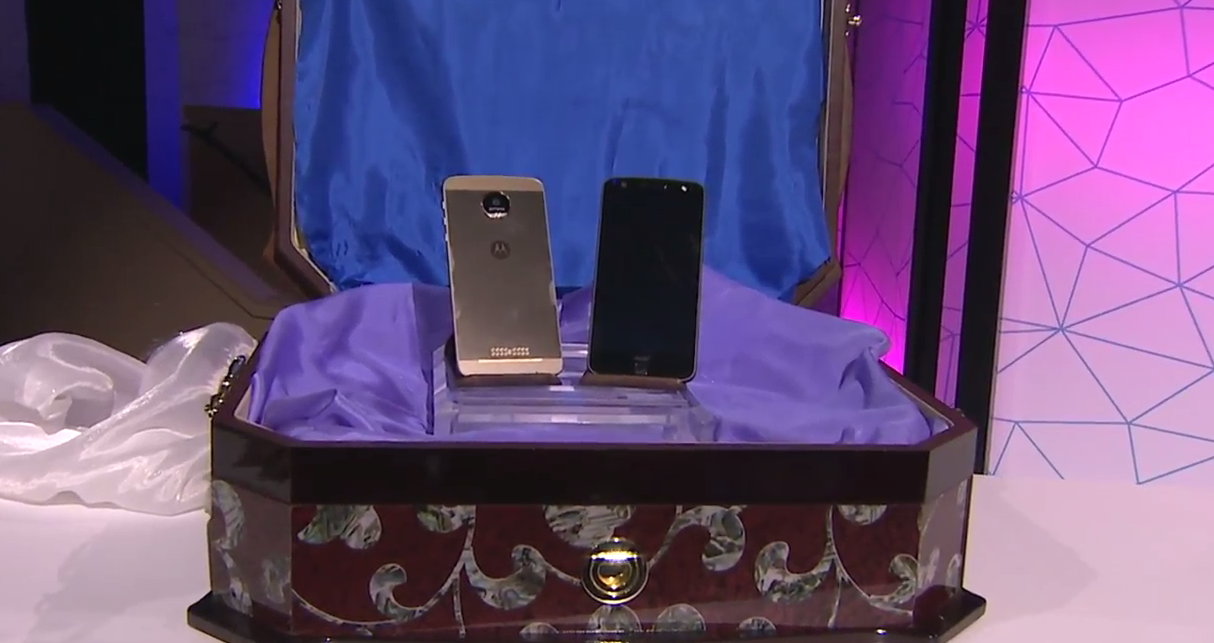As expected, at Tech World 2016 in San Francisco Thursday, Lenovo unveiled its new mobile strategy including both Lenovo-branded and “Moto”-branded smartphones, and even its virtual and augmented reality strategy. Yet, there was so much more.
Check out our highlights.
First, the multinational hardware maker teased working prototypes to show off the latest in bendable screen technology. The first was a narrow, elongated smartphone called the CPlus Smartphone Watch that can be bent to be worn on the wrist like a bracelet. The second was a tablet called Folio that folds along the middle like a book for storage or to double as a smartphone. There was even “One Compute” which allows a phone to become a PC, similar to functionality found in the Windows 10 Phone.
None of the products were ready for release, but the prototypes seemed to function as near-final products, without the aid of cables. Lenovo said it has spent a lot of engineering effort on how to make internal components bendable.
 Intel had a large presence at the show, demoing solutions that it is working on with Lenovo, including VR. Here, Intel CEO Brian Krzanich is playing a game called Unspoken by Insomniac Games against Lenovo CEO Yang Yuanqing.
Intel had a large presence at the show, demoing solutions that it is working on with Lenovo, including VR. Here, Intel CEO Brian Krzanich is playing a game called Unspoken by Insomniac Games against Lenovo CEO Yang Yuanqing.
“If I beat you, you should give us a better discount,” Yang shouted onstage.
One named solution demoed was the new “Intel Replay” technology. It allows traditionally fixed 2D views such as sports to be rotated to be seen at any angle via a touchscreen. Little was said about how the experience is achieved, whether it requires cameras around a stadium, but the effect was live.
Getting into the meat of the announcements, Lenovo announced its first flagship phone for the year, the Phab 2 Pro. In collaboration with Google, the 6-inch QHD device is the first phone to incorporate the search giant’s Project Tango (rebranded onstage to just “Tango”) which adds positioning, depth perception and spacial awareness capabilities to smart devices, similar to Microsoft HoloLens’ spacial awareness.
This is achieved through four cameras that are on the Phab 2 Pro, an 8MP front camera, 16MP rear camera, and a depth camera and motion tracking camera, which will allow the device to offer VR and AR functionality. Furthermore, it has a 4050mAh battery, and will be available globally in September at $499 unlocked.
Lenovo showed off several Tango-enabled demos, including games, virtual reality environments, and 3D measurement capabilities.
In a curious move, Lenovo brought onstage Lowe’s furniture and appliance retailer, which has designed an app allowing home renovations to be planned and budgeted virtually.
The chain announced its app would be launched during the holiday season, and that its stores would even sell the Phab 2 Pro.
Next, after months of speculation as to the fate of the Motorola brand, Lenovo unveiled the first “Moto” smartphones since its corporate restructuring. These are called the Moto Z and Moto Z Force.
In an interesting move, these phones will come with a docking feature that allows modules or “Moto Mods” to be snapped onto the devices magnetically, similar in concept to those of the ThinkPad X1 Tablet.
The phone itself is a 5.5-inch QHD device with AMOLED display, Qualcomm Snapdragon 820, 4GB RAM, 3500 mAh battery with turbo charging and is only 5.2mm thick in order to accommodate modules. Lenovo said its ShatterShield screen is guaranteed to not crack or shatter.
Among the early modules announced include a music speaker add-on called SoundBoost from JBL and the InstaShare Projector, which Lenovo claims can project up to 70 inches and has a built-in stand and battery. Other uses, of course, include battery packs and custom skins, but the company envisions health mods such as blood sugar monitors, dockable PCs, interactive whiteboards and more.
Moto Z will be available worldwide starting in September along with Moto Mods.
Lastly, Lenovo wants Moto Mods to be more than just a few phone accessories, but rather an “ecosystem”. Yang and actor Ashton Kutcher, who is a “product engineer” at the company announced a development contest for the most innovative mods with a grand prize of $1 million. Winners will be picked by a panel that include Yang and Kutcher themselves.









